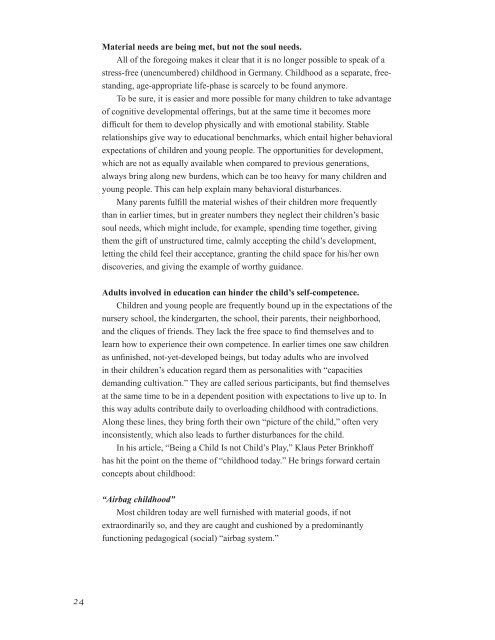Observing the Class Observing the Children - Research Institute for ...
Observing the Class Observing the Children - Research Institute for ...
Observing the Class Observing the Children - Research Institute for ...
Create successful ePaper yourself
Turn your PDF publications into a flip-book with our unique Google optimized e-Paper software.
24<br />
Material needs are being met, but not <strong>the</strong> soul needs.<br />
All of <strong>the</strong> <strong>for</strong>egoing makes it clear that it is no longer possible to speak of a<br />
stress-free (unencumbered) childhood in Germany. Childhood as a separate, free-<br />
standing, age-appropriate life-phase is scarcely to be found anymore.<br />
To be sure, it is easier and more possible <strong>for</strong> many children to take advantage<br />
of cognitive developmental offerings, but at <strong>the</strong> same time it becomes more<br />
difficult <strong>for</strong> <strong>the</strong>m to develop physically and with emotional stability. Stable<br />
relationships give way to educational benchmarks, which entail higher behavioral<br />
expectations of children and young people. The opportunities <strong>for</strong> development,<br />
which are not as equally available when compared to previous generations,<br />
always bring along new burdens, which can be too heavy <strong>for</strong> many children and<br />
young people. This can help explain many behavioral disturbances.<br />
Many parents fulfill <strong>the</strong> material wishes of <strong>the</strong>ir children more frequently<br />
than in earlier times, but in greater numbers <strong>the</strong>y neglect <strong>the</strong>ir children’s basic<br />
soul needs, which might include, <strong>for</strong> example, spending time toge<strong>the</strong>r, giving<br />
<strong>the</strong>m <strong>the</strong> gift of unstructured time, calmly accepting <strong>the</strong> child’s development,<br />
letting <strong>the</strong> child feel <strong>the</strong>ir acceptance, granting <strong>the</strong> child space <strong>for</strong> his/her own<br />
discoveries, and giving <strong>the</strong> example of worthy guidance.<br />
Adults involved in education can hinder <strong>the</strong> child’s self-competence.<br />
<strong>Children</strong> and young people are frequently bound up in <strong>the</strong> expectations of <strong>the</strong><br />
nursery school, <strong>the</strong> kindergarten, <strong>the</strong> school, <strong>the</strong>ir parents, <strong>the</strong>ir neighborhood,<br />
and <strong>the</strong> cliques of friends. They lack <strong>the</strong> free space to find <strong>the</strong>mselves and to<br />
learn how to experience <strong>the</strong>ir own competence. In earlier times one saw children<br />
as unfinished, not-yet-developed beings, but today adults who are involved<br />
in <strong>the</strong>ir children’s education regard <strong>the</strong>m as personalities with “capacities<br />
demanding cultivation.” They are called serious participants, but find <strong>the</strong>mselves<br />
at <strong>the</strong> same time to be in a dependent position with expectations to live up to. In<br />
this way adults contribute daily to overloading childhood with contradictions.<br />
Along <strong>the</strong>se lines, <strong>the</strong>y bring <strong>for</strong>th <strong>the</strong>ir own “picture of <strong>the</strong> child,” often very<br />
inconsistently, which also leads to fur<strong>the</strong>r disturbances <strong>for</strong> <strong>the</strong> child.<br />
In his article, “Being a Child Is not Child’s Play,” Klaus Peter Brinkhoff<br />
has hit <strong>the</strong> point on <strong>the</strong> <strong>the</strong>me of “childhood today.” He brings <strong>for</strong>ward certain<br />
concepts about childhood:<br />
“Airbag childhood”<br />
Most children today are well furnished with material goods, if not<br />
extraordinarily so, and <strong>the</strong>y are caught and cushioned by a predominantly<br />
functioning pedagogical (social) “airbag system.”

















